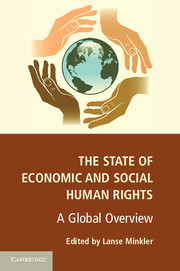1 - Introduction: Why Economic and Social Human Rights?
Published online by Cambridge University Press: 05 February 2013
Summary
To begin to appreciate the magnitude of suffering endured by those living in poverty, consider this: measured head to toe, a traveler condemned to walk on the backs of Earth's population subsisting on $2 per day or less would cover the same distance as four roundtrip voyages to the moon. Such a journey would take fifty-four years of nonstop walking. That option, however, would be better than being forced to say the names of each so afflicted, which would take 195 years of nonstop talking. Moreover, income poverty representations understate the true magnitude of human suffering. Even those with higher incomes may suffer hardships associated with poor health, housing, and education. Their sources of income may be precarious; they may lack clean water and sanitation or otherwise live in a spoiled environment. As always, these maladies disproportionately affect women, children, minorities, and the persecuted and dispossessed.
Although good development and growth policies are necessary, they have not been remotely sufficient to reach those most in need. For instance, researchers have concluded that neither current nor conceivable economic growth rates would be sufficient to achieve the Millennium Development Goal (MDG) of halving even the lower global poverty rate of $1 per day or less from 1990 by 2015 (Besley and Burgess 2003; Kimenyi 2007). Furthermore, policy goals such as those embodied in the MDGs are just that, goals, or desirable objectives. Contrast that approach with the human rights approach. Specifically, economic and social (ES) human rights – the rights to the goods, services, and means to an adequate standard of living – are universal moral entitlements whose power is (or should be) legally ensured. ES rights enable each and every individual to claim sufficient resources to live a dignified life no matter what a country's average income or income distribution might be.
- Type
- Chapter
- Information
- The State of Economic and Social Human RightsA Global Overview, pp. 1 - 18Publisher: Cambridge University PressPrint publication year: 2013

